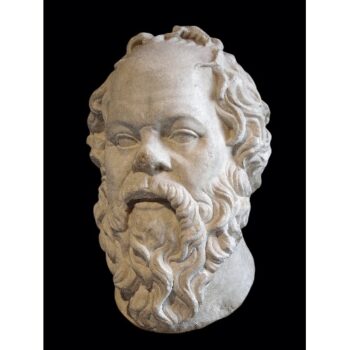RETURN TO TABLE OF CONTENTS
Protagoras
Agnosticism
Protagoras, who in antiquity was often thought to be an atheist, is often considered the most important of the sophists. The argument passed down from him on our inability to know of the existence or the nature of the gods is brief but powerful:
Concerning the gods, I have no means of knowing whether they exist or not or of what sort they may be. Many things prevent knowledge including the obscurity of the subject and the brevity of human life (DK80b4; cp. Gottlieb 134).
His view that we have no means of knowing whether the gods exist is not technically atheist, but agnostic. One prevalent reading of Protagoras is that he indeed was skeptical about our ability to know a good many things. Certainly, the criteria for truth claims about the existence of the gods is troubling. If we examine the world over we see multiple views of the divinity. By what criteria would we know whether one rather than the other is correct? Is there one god? How would we know of that rather than that there are many? If unitary, is She infinite? How would our finite minds grasp and verify god’s infinity?
Here we see Protagoras wanting to know the reasons for our diverse beliefs. He is also hinting at a perspective that some subject matters are more accessible to our understanding than others (or are less obscure). These were clearly philosophic impulses. They seem also to indicate a desire for truth beyond that which Plato claims the sophists have.
Man as the Measure of all Things
The view that Protagoras is most famous for is expressed in Plato’s Theaetetus: “Man is the measure of all things — of all things that are, that they are, of all things that are not, that they are not” (DK 30B1, Waterfield, p. 213). Plato and Aristotle both find that it leads to an incoherent relativism — that view that truth is merely what any given individual takes it to be.
If this is a correct reading of the statement, then indeed, Protagoras has a problem on his hands. Aristotle argues that this claim undermines any productive discourse. For as we can see, two individuals who disagree about something cannot through dialogue or further examination come to a conclusion that one or the other or both of them was wrong. Rather, each would be correct. This also undermines the law of contradiction — according to which something cannot be true and false at the same time. On the basis of a subjective relativist understanding of the quote, Plato famously asks on what basis Protagoras himself then is a teacher if his students already possess as much truth as he does.
The texts that come to us about Protagoras’ views on this quote do show a troubling lack of consistency. In the Theaetetus, he appears to accept the subjectivist relativist interpretation. This does lead lead to the logical inconsistencies pointed out by Plato and Aristotle. Further, it would also render his statements about the gods problematic. Wouldn’t the gods exist for those who believed in them and not exist for those who did not? His attempt to settle this — with a tempered agnosticism — by an appeal to the impossibility of finding the right kind of evidence sets up a standard for adjudicating truth claims in various areas. But in the texts that come to us he does not consistently apply such criteria.
In the Theaetetus Protagoras defends the view of subjective relativism but then goes on to defend his teaching, arguing that though his ideas are not more true than those of his students, he and other teachers are justified in teaching since they can convey ideas that are nonetheless better than those of their students — better in that they offer more sufficient guides for the students and can provide more sound ethical ideas for community life. Here he seems to have the basis for something of a pragmatic, utilitarian view of truth. But he leaves it undeveloped. And he remains thus quite inconsistent.
The love of democracy
Protagoras clearly benefited from the democratic culture in Athens. He was able to make a living. Yet Plato’s typical dismissal of him and other sophists as merely interested in making money from rhetoric seems unfair. He did teach to the wealthier in Athens, so contributed to helping solidify their power. But in fact his view that rhetorical skills should help individuals to de facto make their cases and win the day was democratizing in comparison to other political impulses in Athens — namely that who should rule was simply a matter of birthright. Further Diodorus attributes to him a piece of legislation “to improve the condition of illiterate people, on the grounds that they lack one of life’s great goods.” Indeed he is said to have “thought literacy should be a matter for public concern and expense” (Waterfield, T17, p. 219). In short, he argued that the polis should pay for education.
In various other statements Protagoras shows the value of convention (nomos) over nature (physis). In his view, in our natural state we are unprotected as individuals. Society provides protections for us. Thus it is that law and social convention emerge and serve us. Ethics can thus serve individuals in their social life. Yet he here seems to defend a kind of cultural relativism. Each culture has their own good, and there is no ability to adjudicate one as better than another (cp. Waterfield, 209ff.).
This too leaves him open to questions of consistency. Is he a cultural or a subjective relativist after all? How are we to evaluate the fact that as cultures change, they at least often think that this occurs as they are engaged in a process of learning — of coming to understand truths they once knew not?
Proceed to the next section.
